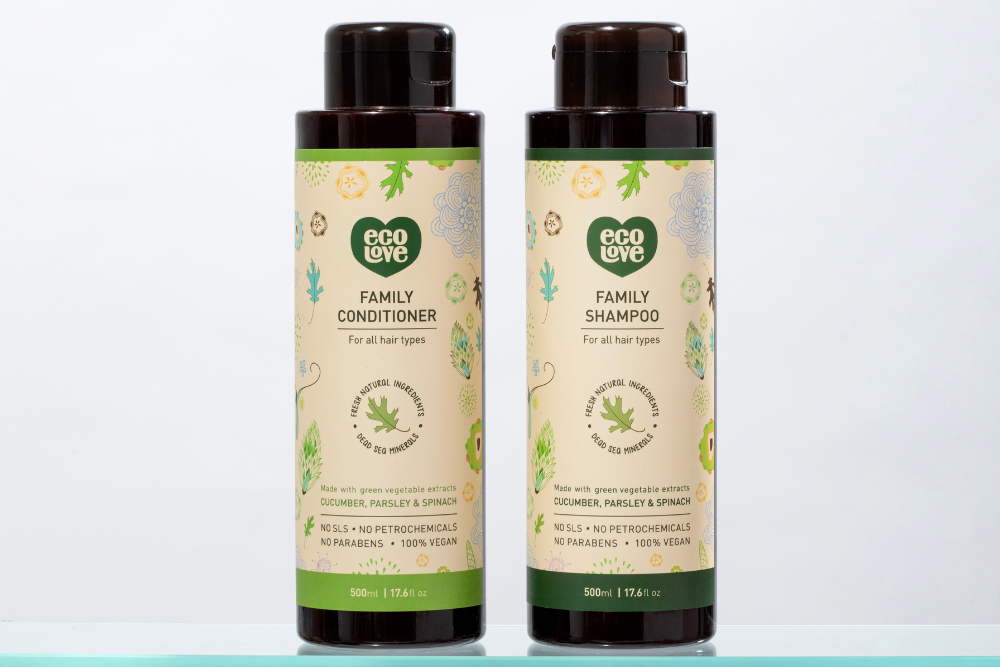Natural shampoo is a healthier choice for both your hair and the planet.
But how do you know you're picking the right one? What ingredients should you look for—and which ones should you avoid? And once you’ve got the perfect shampoo in hand, how do you use it for best results? Let’s break it down, step by step
Advantages of Natural Shampoo Compared to Regular Shampoo:
- Scalp and Hair Health – Natural shampoo is rich in plant-based ingredients and organic extracts such as olive oil, argan oil, jojoba, chamomile extracts, aloe vera, and more, which help maintain scalp balance and prevent dryness, dandruff, and irritation. Plant-based extracts gently cleanse and nourish the hair, leaving it looking healthy, soft, and vibrant.
- Free from Harmful Substances – Natural shampoo does not contain SLS, parabens, or other harsh petrochemical ingredients, preventing cumulative damage to the hair and skin. SLS is a foaming agent known to cause skin irritation. Parabens are aggressive preservatives that are not beneficial for the skin and hair.
-
Environmentally Friendly – Using biodegradable ingredients, recycled packaging, and avoiding water pollution make natural shampoo a greener choice.
Suitable for Various Hair Types – Unlike conventional shampoos, ecoLove offers targeted solutions for every hair type—whether your hair is normal, colored, oily, or chemically straightened.
Organic and Natural Ingredients to Look for in Shampoo:
-
Natural Oils – Oils such as coconut, jojoba, argan, macadamia, and calendula provide the hair with softness, flexibility, and intensive nourishment.
Plant Extracts – Aloe vera, chamomile, lavender, and cucumber are known for their soothing, strengthening, moisturizing, and nourishing properties for the scalp and hair. - Shea Butter – Provides nourishment and protects the hair from dryness and environmental damage.
- Vitamins and Antioxidants – Vitamins A, E, and C help strengthen the hair and protect against environmental damage.

What Doesn’t Belong in Your Shampoo:
- SLS (Sodium Lauryl Sulfate) – A common foaming agent that can cause dryness and scalp irritation.
- Parabens – Preservatives linked to hormonal system disruption.
- Silicones – Provide the hair with an artificially smooth and shiny appearance but accumulate on it and prevent it from absorbing natural moisture.
- Synthetic Colors – May cause sensitivities and allergic reactions.
- Petrochemical Ingredients – Petroleum derivatives are non-biodegradable and may harm health and the environment.
We recommend using the EWG’s Skin Deep database to check the safety of ingredients in personal care products. It offers reliable, science-based information about each substance. And of course, if you have any questions about ingredients in our products, we're always here to help.
Tips for Proper Hair Washing:
- Choosing the Right Shampoo – Most importantly, match the shampoo to your hair type: dry, oily, normal, colored, or straightened. For any questions or advice, we will be happy to assist you!
- Thorough Rinse Before Washing – Rinse your hair with lukewarm-warm water to remove excess dirt and open the cuticle.
- Use a Measured Amount – A little goes a long way – just a coin-sized amount of shampoo is all you need for a thorough cleanse.
- Scalp Massage – Gently massage the scalp in circular motions to improve blood circulation and encourage healthy growth, as well as to achieve optimal scalp cleansing.
- Thorough Rinse After Washing – Ensure there are no shampoo residues on the scalp, as they can cause irritation, oiliness, and dandruff.
- Water Temperature – Warm water opens the cuticle for thorough cleaning, but to finish the wash, it is better to rinse with cool to cold water to close the cuticle and give the hair a natural shine.
- Use of Natural Conditioner – If the hair is dry or frizzy, use a natural conditioner on the hair ends only to prevent scalp oiliness.
- Gentle Drying – Pat gently with a soft towel and avoid aggressive rubbing that can cause hair breakage.
- Use of Hot Styling Tools – Frequent use of heat tools like straighteners, blow dryers, and curlers can weaken your hair over time. For healthier locks, try to limit use and give your hair regular heat-free days.
- Complementary Care Routine – Natural hair masks are a great way to deeply nourish and soften your hair. For best results, use them 1–3 times a week after shampooing. Want to learn more? Check out our full guide to natural hair masks.
ecoLove: Where Natural Hair Care Begins
ecoLove offers a wide range of natural shampoos and body care products made with organic plant extracts and high-quality ingredients. Each collection is thoughtfully crafted to suit different hair types—so you can find the one that’s just right for you. Plus, our bottles are made from recycled plastic, supporting a more sustainable, earth-friendly routine. Switching to natural shampoo is more than a trend—it’s a step toward healthier hair and a more conscious lifestyle. Choose clean, nourishing care that brings out your hair’s natural shine and strength—because you deserve beauty with no compromises.
Written by: Ron Reuven – Naturopath N.D, Clinical Herbalist, and Reflexologist.
The information in this article was written by a certified professional and is intended for general informational purposes. For any personal concerns or questions, we recommend consulting with a qualified healthcare provider.




